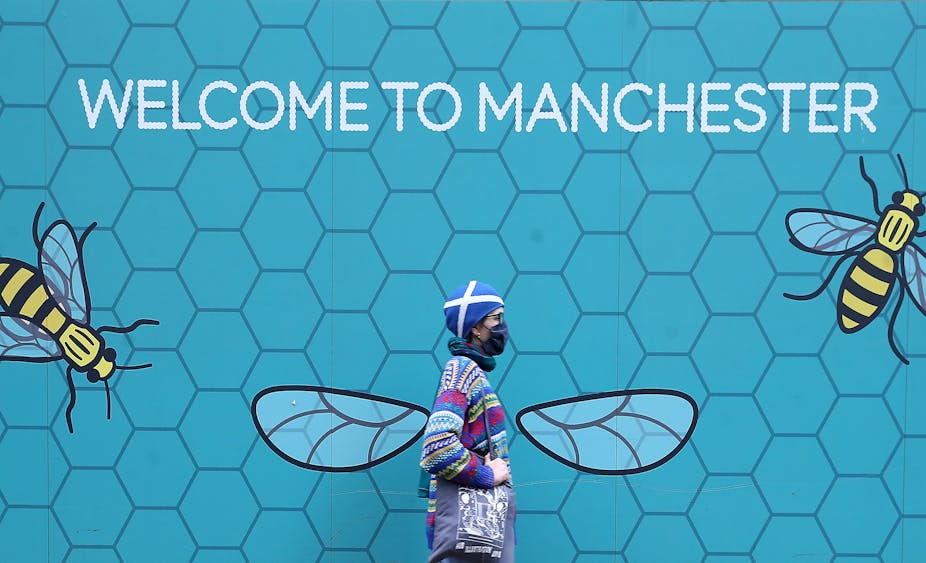In recent days, Boris Johnson’s government has tightened lockdown restrictions in Greater Manchester despite the opposition of the city region’s elected mayor, Andy Burnham. One key point of contention was the financial support that Westminster would provide to the area.
Manchester had originally sought £90 million in business and worker support, but after days of negotiations the government would not go higher than £60 million. Much of this turned on how much to give employees in the region who couldn’t work because of the restrictions: the government wanted to give 67%, but Manchester wanted 80%, in line with the original furlough scheme. The government stuck to its guns, so the city region will get £60 million (plus another £22 million for test and trace).
It is no surprise that talks broke down. Leave aside the politics of a Labour mayor negotiating with a Conservative government. In any situation where a power-wielding agent is selecting one group for negative treatment, there will be tensions.
Understanding these tensions is important because the Manchester case will inform negotiations with the local leaders of other areas facing tier-3 restrictions, such as Nottingham.
Fair play and golden rules
One contributor to these tensions is fairness or, more precisely, perceptions of fairness. It might seem fair that £10 is split evenly between two parties so that each receives £5. But what if I told you that the £10 had been won in a pub quiz and that one party contributed nine of the ten correct responses?
You might see merit in rewarding that contribution. But what if the other player was the designated driver for the evening? You get the idea – lots of narrative details, even in a simple scenario, can tip the balance of fairness one way or the other.
Selecting and framing these narrative details is the job of negotiators. Given the richness of detail in the localised lockdown negotiations, there is lots of scope for each side to make the other appear to be acting unfairly.
A second contributor to the tensions is the importance of signalling and setting a precedent. Standard economic theory suggests that all behaviour can be explained with reference to a golden rule: if the benefits outweigh the costs, then act. In the 1980s, a new band of economists – behavioural economists – started to demonstrate that people reliably failed to act in line with this rule.
A particularly telling laboratory result came from the ultimatum game. In this game, two participants are arbitrarily paired with one another. One participant is selected at random to receive £10, and must decide how much they will offer the other. If the other accepts, both players go home with their agreed shares. If not, both players leave with nothing.

This game served up an important, if contrived, slice of real life. The golden rule suggests that a split where I offer 1p (and keep £9.99) would be accepted, since the benefit of accepting (£0.01) exceeds the benefit of not accepting (£0.00).
In reality, an offer of 1p is virtually never accepted and this finding replicates across a wide variety of cultures. Neuroscientific studies demonstrate that anger responses kick in when people are offered insulting amounts of money.
But why have we evolved an angry response to a situation that could make us a little richer? One answer is that there is a long-term benefit in signalling to others that we cannot be “bought” cheaply. Rejecting a small sum of money sets a precedent. In this view, people may not be violating the golden rule after all.
In the context of regional lockdown payments, a cost to the government of acting generously is that it sets a precedent: it will be expected to act just as generously in all future cases. Yet as we shall see, the cost of not acting generously may be even higher.
How people respond to unfair treatment
It is unsurprising that some people in the highest category of lockdown restrictions feel aggrieved. They face a higher probability of contracting a deadly disease. They might expect that the government would compensate them for this misfortune.
Instead, their livelihoods are threatened by government-imposed lockdown restrictions. In the absence of fair financial support, some would view the government as having discriminated on the basis of where they live. By offering financial support, the government is attempting to keep such people on side. If they consider it insufficiently generous, they may cause harm – not merely to the Johnson government’s re-election prospects but to wider society.

When people feel that a government has not got their best interests at heart, they are less likely to trust government recommendations and advice. When people feel they have been treated unfairly, they also feel angry and uncooperative. In a time and place where cooperation with public health guidance has never been more important, it is dangerous to foster resentment and withdrawal.
This is why the government needs to act fairly and be seen to act fairly. One answer is to allocate resources not via individual negotiations but on the basis of a needs-based formula that gives more to more vulnerable areas, such as those with more service-sector workers.
The shadow chancellor, Anneliese Dodds, suggested that some formula is already in use to determine the appropriate level of funding but the government hasn’t published it. The government should publish this formula as soon as possible for two reasons.
The first is that procedural transparency is an essential element of fairness. The second is that the whiff of suspicion that the government cares more about some parts of the country than others is toxic. In a fractious moment for the UK, fair processes are a necessary first step towards rebuilding trust and unity.

